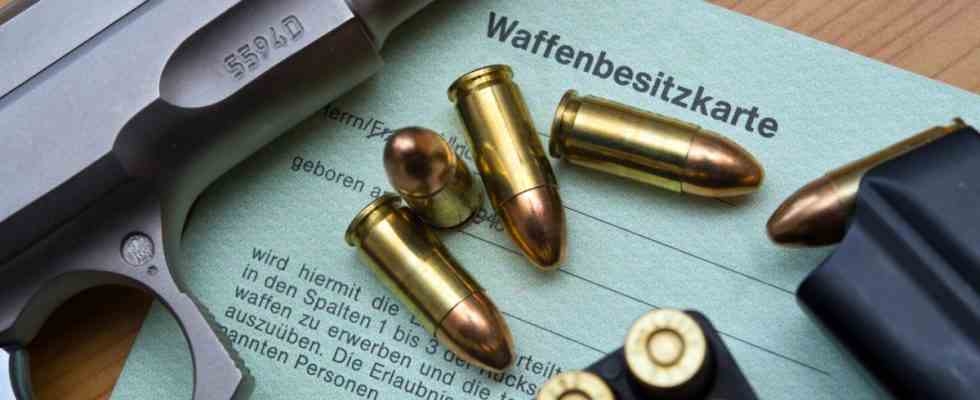Eight dead, including an unborn child and the suspected gunman, eight injured. And there could have been many more victims when shots were fired around 9 p.m. on Thursday evening in a building belonging to Jehovah’s Witnesses in the north of Hamburg. The police were quickly at the scene of the crime. The alleged perpetrator Philipp F. shot himself before he could be overpowered. According to information from security circles, the 35-year-old was not known to be an extremist. Hamburg’s police chief Ralf Martin Meyer said he had been in legal possession of a semi-automatic pistol since December 12. This was also the murder weapon.
According to police chief Meyer, the police received an anonymous tip some time before the crime. In it, a person asked to check whether Philipp F. was legally in possession of weapons and to investigate the suspicion of mental illness. A check in his apartment in February found no violations. Philipp F. was lawfully in possession of a gun license. Both the weapon and ammunition were locked in a safe. There was a bullet in the safe. The police warned the owner about it. There was no legal basis for further steps. Meyer admitted that this is now different against the background of the crime.
Faeser wants to review the draft law again
Politicians are now concentrating on how to prevent people like Philip F. from acquiring legal guns in the future. For Federal Minister of the Interior Nancy Faeser (SPD), the further procedure is clear: the weapons law must be tightened. She has been pursuing the plans for a long time and has already presented a draft law that she now wants to have reviewed again. You certainly have to “go back to the law and see” whether there are still gaps, she said on Friday evening on the ARD “Tagesthemen”. The previous draft was “created under the impression of the attacks in Halle and Hanau”.
The minister’s plans envisage that when applying for a gun owner’s license, it should be checked in future “whether someone is psychologically suitable”. According to Faeser, this requires a check together with the health authorities. “Above all, we want better networking between the authorities.” This is important, for example, when you change your place of residence. When such a card is first issued, there should be a medical certificate.
The weapons law already regulates that when applying for a gun owner’s license, a psychological report must be submitted at one’s own expense – however, this is only required for young people up to the age of 25.
In addition, every applicant, regardless of age, is subject to a “reliability check”. Not only should the municipal weapons authority request an excerpt from the criminal record, but the competent constitutional protection authority should also provide information, for example whether the applicant is or was a member of an anti-constitutional association. According to Section 4 of the Weapons Act, the holders of the weapons owner’s license should actually be checked again at least every three years for their reliability and personal suitability, but in reality this fails due to a lack of staff in the local weapons authorities.
Not enough gun control staff
Faeser said in the daily topics that she considers the regular psychological examination to be very difficult. “Of course, the measures should also be proportionate.” There are also personnel difficulties with weapons control. “We had a time in Germany where we reduced a lot of administration, it was en vogue to save. And now you’re surprised that you can’t carry out the controls anymore.” In the weapons sector, however, a lot of control is needed if one wants to find those who are psychologically impaired or who store weapons incorrectly or in too large numbers.
The interior minister’s plans also envisage banning “semi-automatic weapons similar to war weapons”. Philipp F. legally owned a semi-automatic pistol, which would not be prohibited under the bill.
The police union supports the plans for stricter gun laws. According to a preliminary report published on Saturday by the editorial network Germany (RND), trade union chairman Jochen Kopelke called on the federal government to do this immediately. It is also important to significantly reduce the number of weapons. A quick change in the law due to the “perceived increasing number of incidents” is now more important than a prior systematic review of the adjustment. No time should be lost due to staff shortages and data protection processes.
Also take a close look at the storage of sporting weapons
According to the report, Kopelke emphasized that the private storage of sporting weapons must also be examined. Clubs would have to make proposals for this and the Federal Ministry of the Interior would have to clarify the legal framework. More staff will be needed for planned new queries to the police, federal police and customs criminal police, because otherwise there would be no improvement with a change in the law.
However, not all coalition partners like the plans from the SPD-led Federal Ministry of the Interior: The FDP has so far seen no need to tighten the existing weapons law and wants to put this on hold. “We have strict gun laws in Germany. But even the strictest gun laws don’t really help when people get guns illegally,” Federal Justice Minister Marco Buschmann said after the raid on Reich citizens last year. “We have to enforce our existing law better.” After the killing spree in Hamburg on Thursday evening, the FDP has so far stayed out of the gun rights debate.

